
Did you know there’s an entire family of bacteria living in your gut that is supporting you every single day?
They are making sure you stay healthy, are involved in strengthening your immune system.
They are digesting the food you eat, absorbing and making key nutrients.
They occasionally are starting arguments and making life a little more awkward, by making you fart a lot. On the bright side, it’s their way of signalling that they are healthy and still hard at work looking after you.
Probiotics: are living microorganisms that are intended to positively impact gut health.
They can be found in fermented foods including:
- kefir (cultured, fermented drink)
- tempeh (cooked fermented soybeans that often contains other wholegrains and beans)
- miso (fermented soybean paste)
- kombucha (fermented drink made from tea, bacteria, yeast and sugar)
- yogurt: can be naturally occurring or live cultures may be added.
- kimchi (Korean dish consisting of salted, seasoned and fermented vegetables)
- sauerkraut (fermented cabbage)
It’s important to remember that not all fermented foods are considered probiotics. The beneficial bacteria in fermented foods can be destroyed in heating or filtration processes. For example, sourdough bread starts off containing probiotics but the baking process destroys the good bacteria.
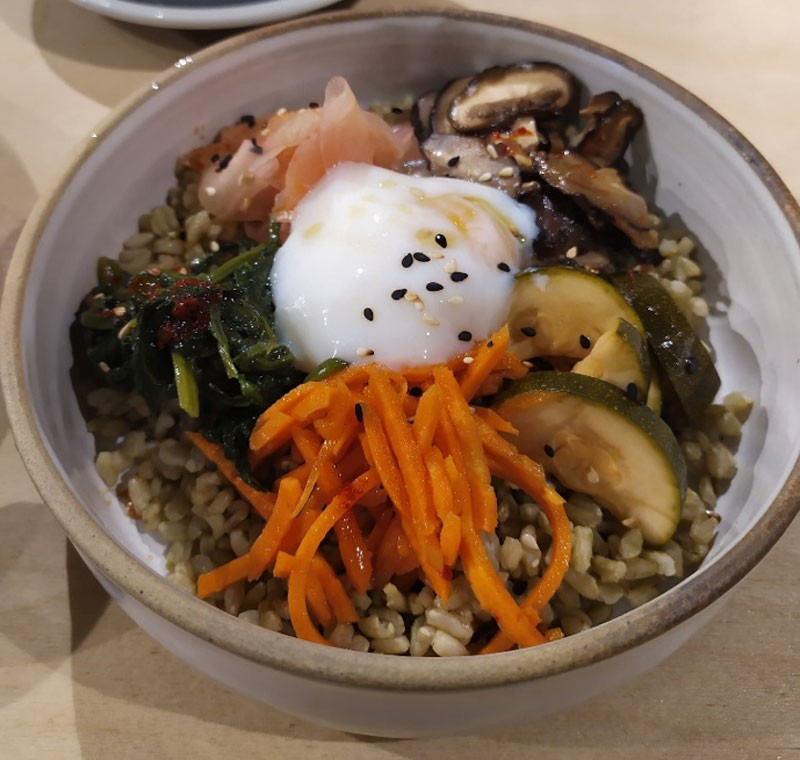
How to include probiotic-rich foods in your diet?
Swap your afternoon snack to a yoghurt that says “probiotic cultures” or “live active cultures.”
Look for a product with at least one billion probiotics per serve (1×109 CFU).
- Looking for a creamy, high-protein yogurt? Siggi’s Icelandic Skyr yogurts are high in protein and low in added sugar. It’s my favourite yogurt because they contain 5 probiotic strains, two of which help digest the lactose in the yogurt. As someone who is lactose intolerant, this is a gamechanger because healthy, lactose-friendly yogurts are rare to come by.
- Want a plant-based yogurt? Activita Dairy Free Oat yogurts contain over 1.6 billion CFU per serving. Its’ also low in added sugar and low in fat. This yogurt contains 4 different probiotic strains
- CFU = colony forming units (amount of micro-organisms in the product)
Try drinking kefir. It has a tangy sour and creamy taste.
I often blend in fresh strawberries or frozen mango to create a slightly sweeter, high-protein drink that is perfect for a hot summers day. While yogurt is made from lactic acid fermentation process with bacteria, kefir undergoes lactic acid fermentation and alcoholic fermentation using both yeast and bacteria. Kefir also tend to have more strains of probiotics than yogurts, with the Culture Co kefirs containing 13 probiotic strains. Kefir is available in drinkable forms and yogurt-style products in the refrigerated section at major supermarkets and Middle-eastern grocery stores.
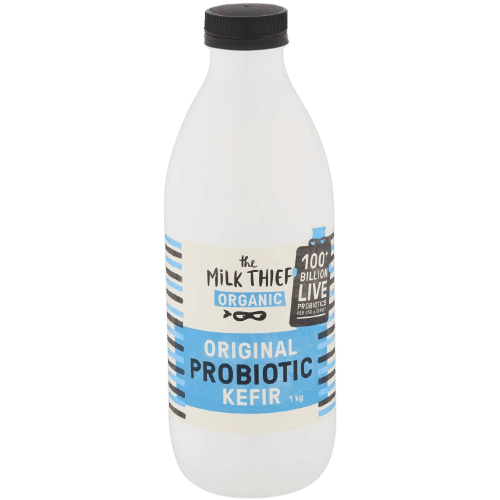
Love fizzy drinks?
No-sugar soft drinks often have artificial sugars that can cause gut at discomfort, leaving you feeling gassy and bloated. Kombucha is a great alternative that as no artificial sugars and tastes like fizzy tea. One of the benefits of ordering off Soulara is that you can add on kombucha to your meals. You can replace one of your meals with 3x350mL bottles of kombucha!
If you struggle with feeling bloated on a regular basis, check out How To Get Rid of Bloating [Ask A Nutritionist].
Create your own miso sauce.
The secret to ensure the probiotics aren’t destroyed by heat during cooking is to add them after cooking. Miso pairs well with creamy sauces (hummus, tahini, mayonnaise) adding a deep umami flavour and saltiness. Miso & tahini sauce is the perfect sauce for drizzling over roasted vegetables and salad bowls. Simply mix together 1 tablespoon of white miso, 4 tablespoon of tahini and 1 tablespoon of lemon juice. If a thinner consistency is preferred, add warm water and stir until desired consistency is achieved.
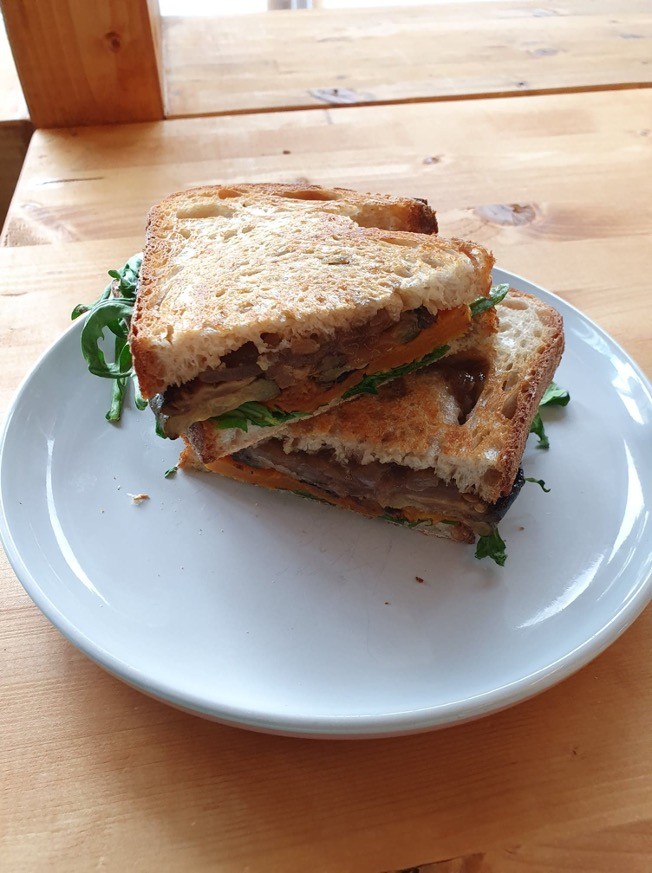
Add sauerkraut or kimchi to your main dishes.
The best part is, they are fun to make at home or you can buy it from your and eat it as is. No cooking required. This makes them perfect for adding to pre-prepared meals. I love to add kimchi to rice-based meal such as the Bondi Meal Prep’s Free Range Chicken Thigh, Green Beans and Brown Rice. See Bondi Meal Prep’s reviews.
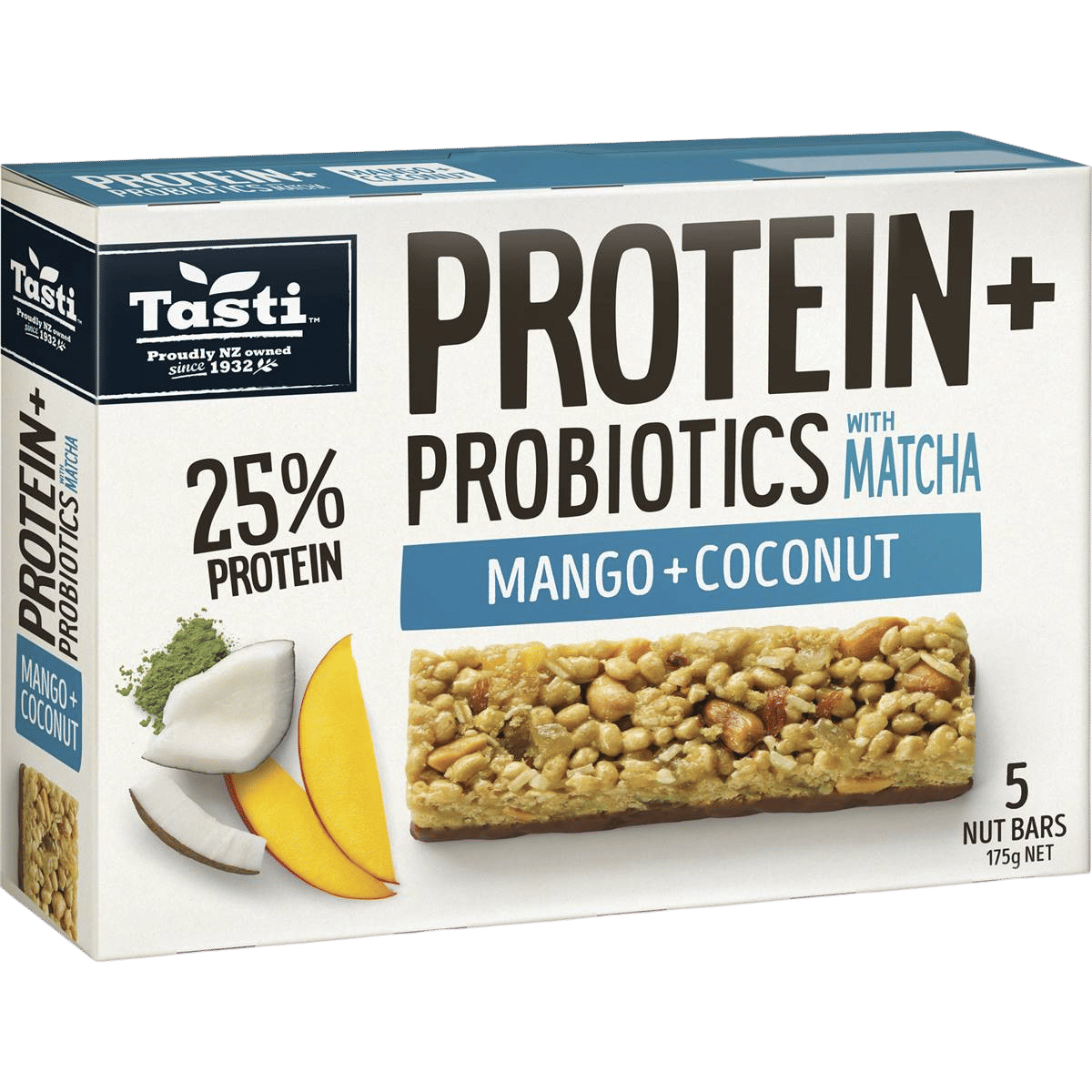
Looking for a portable snack with probiotics?
Probiotic Supplements
Scientific research has found potential benefits of using probiotics in the prevention and management of irritable bowel syndrome, constipation, diarrhea, diverticular disease, ulcerative colitis, UTIs and eczema in young children. Whilst it is acknowledge that probiotics may benefit these conditions, probiotics are not the first-line of treatment and is often used in conjunction to other interventions. In particular, probiotics is included as a low-cost and low risk intervention for preventing anti-biotic associated diarrhoea in children and adults.
The benefits:
Including a wide variety of probiotic-containing foods and/or supplements in your diet assist in:
- improving your digestion (improve digestion of lactose, reduce constipation and diarrhea symptoms)
- improve microbial diversity (more beneficial bacteria in your gut)
- decreasing your risk of chronic disease (by influencing LDL cholesterol levels and blood pressure)
- weight management
The Downsides:
- excessive amounts of probiotics can worsen constipation, diarrhea, bloating and gas. To minimise the risk of side-effects, start with a low dose and gradually increase.
- Probiotics can have negative impacts on gut health. Some studies showed that probiotic use after 1 week of antibiotic use significantly delayed the recovery of the gut microbiome back to pre-antibiotic state compared to individuals that recovered without any treatment.[1]
- Research on probiotics is still emerging and many supplements have been shown to lack effectiveness.[2]
- The long-term effects of probiotic supplements are unknown. [3]
- probiotic supplements are not suitable for individuals who are immunocompromised, underwent prolonger hospitalisation or recent surgery. seek guidance from medical professionals.
- probiotics supplements can be expensive
Dairy products with live cultures are recognised in Australian policy and regulation as providing possible health benefits such as “improved lactose digestion” and “this product as a part of a healthy diet may reduce stomach upset”. Food producers are required to provide the type and number of micro-organisms in a product.
What does it even mean?
Lactobacillus acidophilus CL1285
GENUS SPECIES STRAIN
There are different types of probiotic species and strains that have been found to be beneficial for certain conditions. It’s important to remember that probiotics of different species have different benefits.
For example:
- Lactobacillus acidophilus has been shown to be helpful in improving lactose digestion, constipation, reducing the length of infectious diarrhea and may improve irritable bowel symptoms.
- On the other hand, Lactobacillus paracasei may decrease the incidence of atopic dermatitis[4] and the risk of dental caries in children.[5]

Are they safe?
The 5 most common and well-researched probiotics are Lactobacillus, Bifidobacterium, Escherichia, Saccharomyces and Lactococcus. Probiotic supplements used at recommended doses are considered “low-risk” in healthy people. However, it is important to talk to your GP first to determine what strain and dose is suitable for you. [6]
There have been reported cases of increased infection risk from probiotic use in individuals with immunodeficiency or severe illnesses.
Disclaimer: Standard treatment of health conditions cannot be replaced with probiotics. Consult your medical professional for individualised advice.
The most common probiotics and their potential benefits[7]
| Probiotic Type | Potential Benefits |
| Lactobacillus |
|
| Bifidobacterium |
|
| Escherichia |
|
| Saccharomyces |
|
| Lactococcus |
|
Will taking probiotics improve your gut health?
When it comes to improving gut health, the research has consistently been in favour of eating a wide variety of plant-based foods including fermented foods.
Unfortunately, a one size fits all approach is not appropriate when it comes to probiotic supplementation. The difficulty with probiotics is that there are so many strains and the effectiveness of a specific strain is dependent on individuals specific gut microbiome. Because we each have unique ecosystem of gut bacteria, it is difficult to determine what type and dosage is appropriate for each person and their condition.
Further research is needed in order to determine which probiotic is most effective and suitable for different individuals. It is up to you to decide whether the potential benefits outweigh the potential risks and costs.
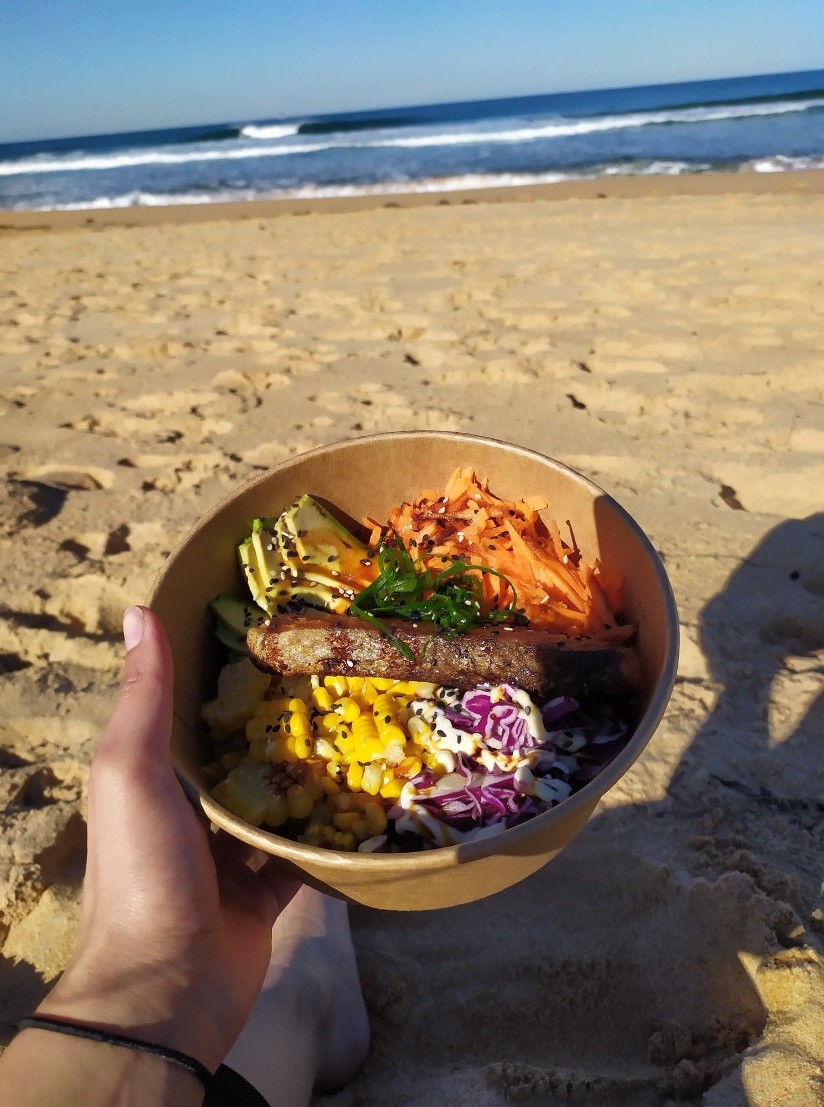
The verdict: How to make your gut happy?
Probiotics have the potential to support gut health and improve digestive issues but they are not a cure-all pill. Probiotic supplements generally contain only a few different strains, whereas having a wider variety of foods will more effectively increase your gut diversity.
Remember the best thing you can do for your gut health and to protect yourself from chronic diseases, is to eat a well-balanced diet filled with variety. A 2018 national survey showed that 93% of Australians aren’t eating enough vegetables per day!
Until there’s more research backing up probiotic supplements, I’m going to stick to upping my vegetables intake and adding in fermented foods.



